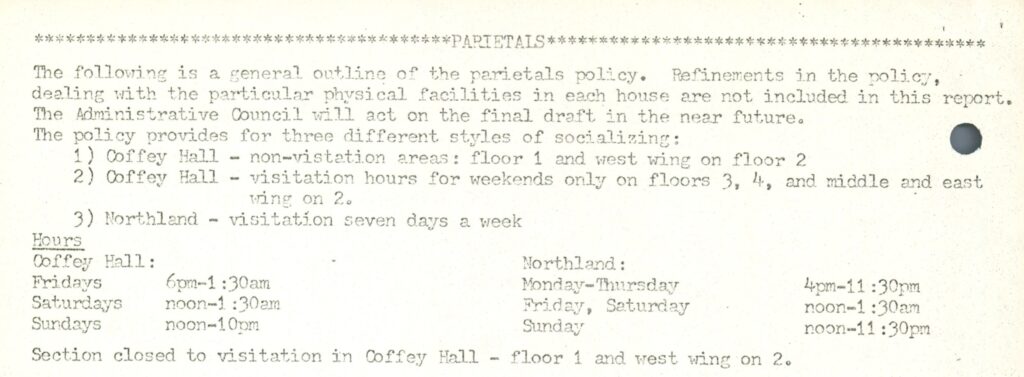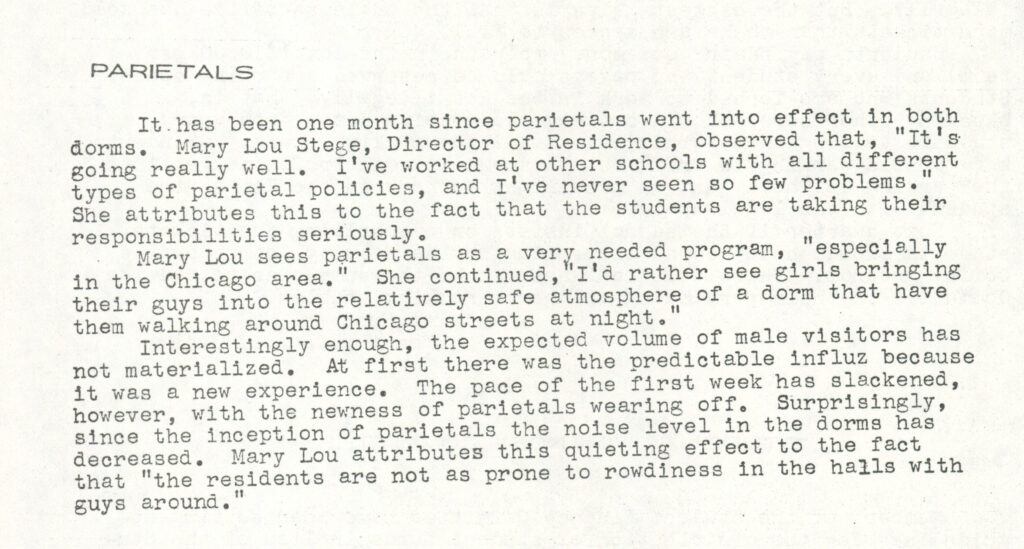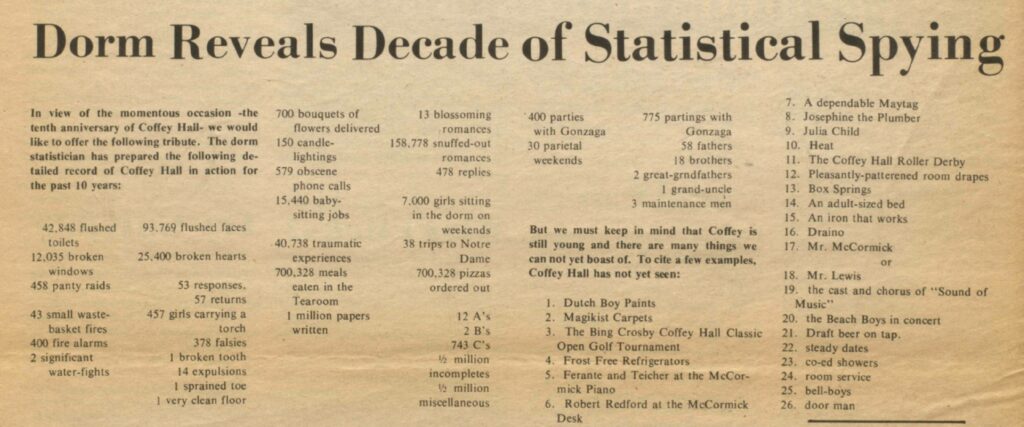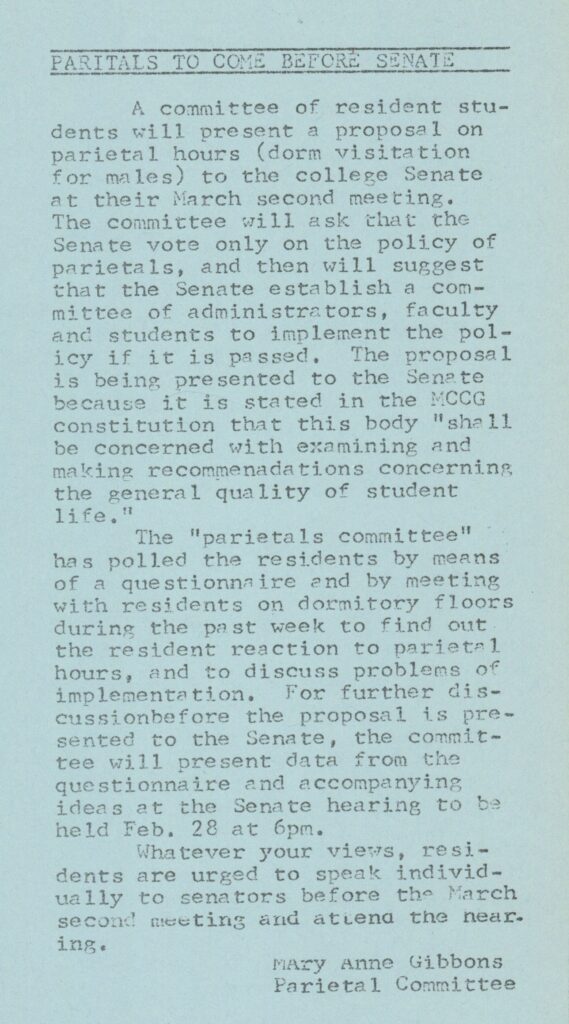Dialogue was first published in 1972 to give Mundelein College* students a voice to discuss their concerns in a public forum. The first publication lists “the communication of ideas” as Dialogue’s “most important function.” The staff kept folders for submissions in multiple locations so members of the community could raise their concerns anonymously.
One of the very first issues raised was that of the dorm “parietals,” in Mundelein’s case, the rules regarding men visitors to women’s dorms. Many of Coffey Hall’s residents felt that the current regulations were unfair and outdated. Incoming freshmen felt that “they should be permitted to entertain friends in their ‘homes’, and to deny this right is unfair, a violation of personal rights.” Students bemoaned the fact that they were legal adults who were allowed to vote but not allowed to have male friends over.
The third issue of Dialogue announced that the issue of parietals was going to be brought before the college senate by the “parietals committee” composed of concerned students who had, the week before, polled and interviewed dorm residents to get their opinions and discuss parietal hours. The committee urged students to show up to the meeting and share their thoughts.
The next issue fails to mention parietals, which might seem like it is suggesting a failure to implement any changes. However, in the final issue of the 1971-72 school year, Dialogue released a revised outline of the parietals policy as follows:
1) Coffey Hall – non-visitation areas: floor 1 and west wing on floor 2
2) Coffey Hall – visitation hours for weekends only on floors 3, 4, and middle and east wing on 2.
3) Northland – visitation seven days a week

This wasn’t a free-for-all. Even when visitation was allowed seven days a week there were still hours to abide by.
Coffey Hall: Friday 6pm-1:30am, Saturday 12pm-1:30am, Sunday 12pm-10pm
Northland: Monday-Thursday 4pm-11:30pm, Friday and Saturday 12pm-1:30am, Sunday 12pm-11:30pm
Residents were responsible for monitoring their guest. As these rules list, “Males on the floors must always be in company of a resident,” and “She must ask him to leave if his conduct disturbs the other residents.” Residents’ penalties for their guests overstaying their welcome included a two-week suspension of visiting privileges and, if repeated often, would require an appearance before the Hall Judiciary Board.
Residents could be suspended from the dorm for:
a) guest’s illegal entry; b) failure to sign a guest out; c) having male guests in non-visitation room or area

These rules were polished and put in place in October 1972. Dialogue staff interviewed Mary Lou Stege, Director of Residence, who was pleased with the new parietals. She said that she’d “rather see girls bringing their guys into the relatively safe atmosphere of a dorm [than] have them walking around Chicago streets at night.” Once the novelty of male visitors decreased, the pace slowed considerably. In addition, there was a noted noise level decrease in the dorms. As the writer said, “Mary Lou attributes this quieting effect to the fact that ‘the residents are not as prone to rowdiness in the halls with guys around.’”
Mundelein’s parietal rules continued to be mentioned in later issues, such as this article from 1973 discussing Coffey Hall’s tenth anniversary.

* Mundelein College, founded and operated by the Sisters of Charity of the Blessed Virgin Mary (BVM), provided education to women from 1930 until 1991, when it affiliated with Loyola University Chicago.
Sources: Mundelein Now, Mundelein College Paper Records: Digitized files mc_now_0006, mc_now_0014, mc_now_0018, mc_now_0025.
Brooke is a first-year student in the Public History MA at Loyola University. She has a BA in History from Macalester College in St. Paul, Minnesota. Her research interests include medical history and women’s history. Her non-history hobbies include quilting, hiking, reading, and her pet snails.
Loyola University Chicago’s Women and Leadership Archives Blog is designed to provide a positive environment for the Loyola community to discuss important issues and ideas. Differences of opinion are encouraged. We invite comments in response to posts and ask that you write in a civil and respectful manner. All comments will be screened for tone and content and must include the first and last name of the author and a valid email address. The appearance of comments on the blog does not imply the University’s endorsement or acceptance of views expressed. Questions? Please contact the WLA at wlarchives@LUC.edu.

